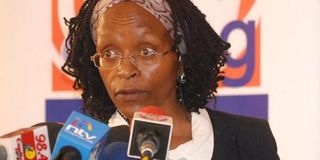Regulator’s decision to scrap 2 top rights NGOs is suspect

Africog Executive Director Gladwell Otieno. NGOs Coordination Board says her non-profit is not registered. FILE PHOTO |
What you need to know:
- Some of these NGOs have today become the favoured children of aid agencies because they play the counterweight to state power.
- The NGOs Coordination Board has evolved into a predatory bureaucracy that sees its primarily role in state security terms.
- CEO Fazul Mahamed pretends to have the powers to order the Central Bank, the regulator of the financial sector, to freeze Africog’s accounts.
Mr Aden Duale has sent notice that the first agenda of the new Jubilee administration in the National Assembly will be to apply its parliamentary strength to remove Auditor-General Edward Ouko from office.
In the middle of it all, the NGOs Coordination Board has launched a major assault on two leading civil society organisations, the Kenya Human Rights Commission and the African Centre for Open Governance (Africog).
The board wants both organisations shut down. It has also ordered the arrest of the top officials of these organisations.
Coming in the wake of preparations for assumption of office by a new administration, the signal out there is that institutions the Constitution has given space and latitude to question and hold our rulers to account may be in for a rough time.
Some of these NGOs have today become the favoured children of aid agencies because they play the counterweight to state power.
They are regarded as the essential components of the thriving civil society in Africa. I predict a great deal of drama in the High Court in the coming weeks.
PAYMENT OF TAXES
The big question the High Court must answer is: Beyond monitoring and registering presence, apart from basic disclosure, regular reporting and payment of taxes, how much is the State entitled to know about the operations and finances of NGOs?
These are pertinent questions because NGOs, like limited liability companies that must account to shareholders, must principally account to the people who fund their operations, namely, donors and international agencies.
Like shareholders of listed companies, it is donors and agencies who appoint auditors for NGOs.
When they break the law — where they are found by the Kenya Revenue Authority to have failed to pay taxes — they, like any other citizen, must face the wrath of the relevant authorities.
The board has evolved into a predatory bureaucracy that sees its primarily role in state security terms. It pretends to have powers to direct the Directorate of Criminal Investigations to investigate and arrest officials of the Kenya Human Rights Commission.
REGULATOR
CEO Fazul Mahamed pretends to have the powers to order the Central Bank, the regulator of the financial sector, to freeze Africog’s accounts.
When did we give these bureaucrats the powers of the Directorate of Public Prosecutions?
The board has misinterpreted the reason it was created, namely to promote and facilitate growth of a thriving voluntary sector.
It was not supposed control and stifle. Why have we allowed bureaucrats and paper-pushers to pretend to have the capacity and powers to determine which NGO presents a security risk?
Part of the reason the board is obsessed with security and political issues is in its history.
In its initial stages, its chairmen and most of the workforce tended to be retired provincial administrators.
SECURITY RISK
The fact that it was domiciled under the Office of the President only served to entrench the mind-set that NGOs were a security risk.
I still remember one of the first decisions made by the former head of public service, Dr Richard Leakey, after he assumed office, was to transfer the board to the Ministry of Culture and Social Services.
The framers of the legal framework for the NGO sector wanted a regulatory regime based mainly on self-regulation.
This is why the NGO Council was created. What explains the timing of the crackdown on the KHRC and Africog?
It is the rumours that they were planning to lodge a petition against the presidential elections that made the assault more urgent.
The second problem with the board is weak administrative capacity.
MONITORING SECTOR
These are just but fumbling bureaucrats lacking capacity to do even rudimentary monitoring of the sector such as counting the number of NGOs and the amount of funding they get.
We must accept that the regulatory regime has failed.
If you want to register an NGO today, just avoid the board because you can achieve legal existence through other routes.
You can choose to be registered as a company limited by guarantee. You can decide to be registered by the Ministry of Lands under trust laws.
There are international NGOs that operate under memoranda of agreements signed with specific ministries.
Self-help groups and rural-based CBOs report to the Ministry of Social Services, while NGOs operating under the aegis of church bodies can do so without having to file returns to the board.
The government must come up with a more comprehensive legal framework for regulating and promoting the growth of the sector – including a method of classifying all these institutions that go by the name NGO. The NGOs Co-ordination Board should be scrapped. Period.





